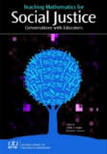A Call for Collective Action
Join CMC-South and members of the Mathematics Education Community for a second year dedicated to building our collective knowledge and understanding of topics and issues related to Equity and Social Justice in Mathematics so that we may begin to take action.
Contributing Organizations & Educators
|
|
|
CMC-South Book Study Selection
Teaching Mathematics for Social Justice: Conversations with Educators edited by Anita A Wager and David W. Stinson
|
Focus Questions for the Year
|
Calendar of Readings
|
November - December 2017 Reading (Webinar January 2018)
Suggested by the National Council of Teachers of Mathematics (NCTM) The Impact of Identity in K-8 Mathematics. Targeted Questions:
January - February 2018 Reading (Webinar March 2018) Suggested by the National Council of Supervisors of Mathematics (NCSM) Excellence Through Equity: Five Principles of Courageous Leadership to Guide Achievement for Every Student (2016) by Alan M. Blankstein and Pedro Noguera Blanstein & Noguera (2016) talk about courage as the essential human virtue, and how courageous leadership is the “engine that drives the paradigm shift”. Targeted Questions:
March - April 2018 Reading (Webinar May 2018) Suggested by California Mathematics Council-South (CMC-S) Teaching Mathematics for Social Justice: Conversations with Educators, edited by Anita A. Wager and David W. Stinson Targeted Questions:
May - June 2018 Reading (Webinar July 2018) Suggested by TODOS: Mathematics for ALL Focused article from TEEM 7- Special Issue: Mathematics Education Through the Lens of Social Justice Targeted Questions:
|
July - August 2018 (Webinar September 2018)
Suggested by the Association of Mathematics Teacher Educators (AMTE) Chapter 16: How Do I Learn to Like This Child So I Can Teach Him Mathematics: The Case of Rebecca (Mary Q. Foote with accompanying commentaries)
Targeted Questions:
September - October 2018 (Webinar November 2018) Suggested by the Journal of Urban Mathematics Education (JUME) Three Articles Mathematics as Gatekeeper: Power and Privilege in the Production of Knowledge (Martin et al JUME 2010) “Both And”—Equity and Mathematics: A Response to Martin, Gholson, and Leonard (Confrey JUME 2010) Engaging Students in Meaningful Mathematics Learning: Different Perspectives, Complementary Goals (Battista JUME 2010) Targeted Questions:
November - December 2018 (Webinar 2019) Suggested by Robert Q. Berry III For White Folks Who Teach in the Hood... and the Rest of Y'all Too: Reality Pedagogy and Urban Education (2016) by Christopher Emdin. The author discusses different types of pedagogies grounded in the resources that communities can offer for teaching; The author introduces 7'Cs. Targeted Questions:
|
A Call for Collective Action Contributing Organizations & Educators
|
|
Resources
TODOS and NCSM Joint Position Paper: Mathematics Education Through the Lens of Social Justice: Acknowledgement, Action, Accountability.
TODOS: Teaching for Equity and Excellence in Mathematics (TEEM) Publications
NCTM Position Paper: Access and Equity in Mathematics
NCTM Clip: Classroom Practices that Support Equity-Based Mathematics Teaching
Marta Civil: Working Towards Equity in Mathematics Education: A Focus on Learners, Teachers, and Parents
Teaching for Robust Understanding (TRU) Framework
Math Forum: Key Issues of Equity Resources
TODOS: Teaching for Equity and Excellence in Mathematics (TEEM) Publications
NCTM Position Paper: Access and Equity in Mathematics
NCTM Clip: Classroom Practices that Support Equity-Based Mathematics Teaching
Marta Civil: Working Towards Equity in Mathematics Education: A Focus on Learners, Teachers, and Parents
Teaching for Robust Understanding (TRU) Framework
Math Forum: Key Issues of Equity Resources
|
TODOS is a CMC-South Partner Orgnaization
|
TODOS: Mathematics for ALL is an international professional organization that advocates for equity and excellence in mathematics education for ALL students - in particular, Latina/o students. TODOS advances educators' knowledge, develops and supports education leaders, generates and disseminates knowledge, informs the public, influences educational policies, and informs families about education policies and learning strategies. All of these goals ultimately result in providing access to high quality and rigorous mathematics for ALL students.
|











